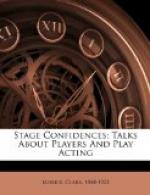I was a little, stiffly starched person, and I remember that I sat on some one’s silk lap, and slipped and slipped, and was hitched up and immediately slipped again until I wished I might fall off and be done with it. Near me sat a little old maiden lady, who had come in from her village shop to see “the show.” She wore two small, sausage curls either side of her wrinkled cheeks, large glasses, a broad lace collar, while three members of her departed family gathered together in one fell group on a mighty pin upon her tired chest. She held a small bag on her knee, and from it she now and then slid a bit of cake which, as she nibbled it, gave off a strong odour of caraway seed.
[Illustration: John E. Owens]
Now the actor was clever in his “make-up,” and each time he appeared he looked thinner than he had in the scene before. Instead of laughing, however, the old woman took it seriously, and she had to wipe her glasses with her carefully folded handkerchief several times before that last scene, when she was quite overcome.
His catch phrase had been, “Oh! oh! how hungry I am!” and every time he said it, she gave a little involuntary groan; but as he staggered on at the last, thin as a bit of thread paper, hollow-cheeked, white-faced, she indignantly exclaimed, “Well now, that’s a shame!”
The people laughed aloud; the comedian fixed his eyes upon her face, and with hands pressed against his stomach groaned, “O-h! how hungry I am!” and then she opened that bag and drew forth two long, twisted, fried cakes, rose, stood on her tip-toes, and reaching them up to him tearfully remarked:—
“Here, you poor soul, take these. They are awful dry; but it’s all I’ve got with me.”
The audience fairly screamed; but poor and stranded as that company was, the comedian was an artist, for he accepted the fried cakes, ate them ravenously to the last crumb, and so kept well within the character he was playing, without hurting the feelings of the kind-hearted, little old woman.
It’s pleasant to know that that clever bit of acting attracted the attention and gained the interest of a well-to-do gentleman, who was present, and who next day helped the actors on their way to the city.
A certain foreign actor once smilingly told me “I was a crank about my American public.” I took his little gibe in good part; for while he knew foreign audiences, he certainly did not know American ones as well as I, who have faced them from ocean to ocean, from British Columbia to Florida. Two characteristics they all share in common,—intelligence and fairness,—otherwise they vary as widely, have as many marked peculiarities, as would so many individuals. New York and Boston are the authorities this side of “the Great Divide,” while San Francisco sits in judgment by the blue Pacific.
One never-to-be-forgotten night I went to a fashionable theatre in New York City to see a certain English actress make her debut before an American audience, which at that time was considered quite an interesting event, since there were but one or two of her countrywomen over here then. The house was very full; the people were of the brightest and the “smartest.” I sat in a stage box and noted their eagerness, their smiling interest.




